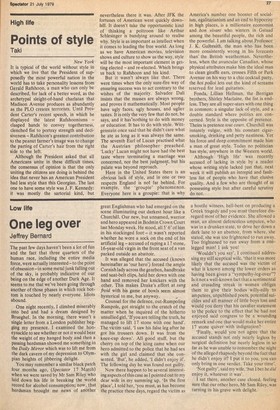High life
Points of style
Taki
New York It is typical of the world without style in which we live that the President of supposedly the most powerful nation in the world has to take personality lessons from Gerald Rafshoon, a man who can only be described, for lack of a better word, as the archetypal sleight-of-hand charlatan that Madison Avenue produces as abundantly as the PLO creates terrorists. Until Presdent Carter's recent speech, in which he displayed the latest Rafshoonisms — clasped hands to convey togetherness, clenched fist to portray strength and decisiveness — Rafshoon's greatest contribution to the peanut farmer's image was to change the parting of Carter's hair from the right side to the left.
Although the President asked that all Americans unite in these difficult times, the consensus of opinion is that the only uniting the citizens are doing is behind the idea that never has an American President had less style than this Georgian. The last one to have some style was J. F. Kennedy: it was mostly the sartorial kind, but nevertheless there it was. After JFK the fortunes of American went quickly downhill. It doesn't take the opportunistic kind of thinking a poltroon like Arthur Schlesinger is bandying around to realise why. Style is as important as intellect when it comes to leading the free world. As long as we have American movies, television shows and culture to show us the way, style will be the most important element in getting elected — and re-elected. Which brings us back to Rafshoon and his kind.
But it wasn't always like that. There were times when the only sure-fire way of ensuring success was to act contrary to the wishes of the majority. Salvador Dali insists that the masses are always wrong, and proves it mathematically. Most people have ugly faces, ugly houses, and uglier tastes. It is only the very few that do not, he says, and it has*nothing to do with money or education. It has to do with style. Wittgenstein once said that he didn't care what he ate as long as it was always the same. The seventh Earl of Lucan practised what the Austrian philosopher' preached. 'Lucky' Lucan might not have had the best taste where terminating a marriage was concerned, nor the best judgment, but his palate was beyond reproach.
Here in the United States there is an obvious lack of style, and in one or two respects England is not far behind. For example, the 'groupie' phenomenon. Everyone here is a groupie: that is why America's number one booster of socialism, egalitarianism and an end to hypocrisy in high places, is a millionaire economist and bon vivant who winters in Gstaad among the beautiful people, the rich and the powerful. I am talking about Professor J. K. Galbraith, the man who has been more consistently wrong in his forecasts than' the British weatherman. Nevertheless, when the .avuncular Canadian, whose physical attributes make him the ideal man to clean giraffe ears, crosses Fifth or Park Avenue on his way to a chic cocktail party, the hoi polloi lets out the kind of screams reserved for lead guitarists.
Fonda, Lillian Hellman, the Berrigan brothers, Shirley Maclaine, the list is endless. They are all super-stars with one thing in common: a singular lack of style, and a double standard where politics are concerned. Style is the opposite of pretence. Theirs is pretence tout court. Churchill was innately vulgar, with his constant cigarsmoking, drinking and petty nastiness. Yet his force and deep commitment made him a man of great style. Today no politician has style, anywhere in the Western world.
Although 'High life' was recently accused of lacking in style by a reader whose writing style lacked just that, next week it will publish an intrepid and faultless list of people who have that elusive quality. And a few who are thought of as possessing style but after careful scrutiny do not.


































 Previous page
Previous page